Violinist Shmuel Ashkenasi
and
Violist Richard Young
of the
Vermeer Quartet
A Conversation with Bruce Duffie
This is one of the few conversations I have had with more than one
guest. Two members of the Vermeer Quartet, founder and first violinist
Shmuel Ashkenasi, and violist Richard Young, came to my home-studio in
June of 1989. Happily, it was a true conversation, with the ideas
flowing back and forth among all three of us. So rather than just
going back-and-forth, watch the indications of who is speaking.
Note that the second violinist shown above, Mathias Tacke, joined
the ensemble in 1992, so the discussion on this webpage makes references
to Pierre Menard, who can be seen on the left in the LP cover-photo below.
Continuing toward the right in the photo are Shmuel, Richard, and Marc.
While setting up for the interview, the talk was about
the instruments, and specifically the technical needs of the bows . .
. . . . . . .
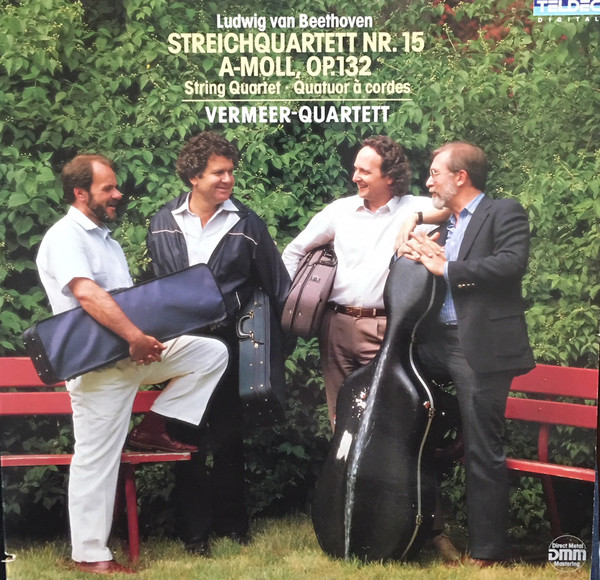 Bruce Duffie: How often do bows have to
be re-haired?
Bruce Duffie: How often do bows have to
be re-haired?
Shmuel Ashkenasi: It depends on the
hair, and it depends on the player. If you use the same bow
all the time, probably just once a month, or once in six weeks. I
use more than one at a time, so I do it about every three months. I
have a whole bunch of bows.
Richard Young: We would change bows
between movements if it were possible.
BD: Why? What is it about the
hair that makes the sound different from one bow to another, or one
re-hairing to another?
Shmuel: Basically, the hair produces
the sound. It’s the fact that it is not slick. It is
coarse. If it is too coarse, the rosin will cake, and then it
will be too crunchy. If it’s too slick, then it doesn’t speak.
Then there is the strength of the hair.
BD: Do you specify a certain brand
of hair, or a certain thickness of hair, or hair from a certain animal?
Shmuel: No, it’s always horsetail,
and the best hair comes from Siberia and China. They all say
they have the best hair, and then you try it and it’s not good. Either
it breaks, or it doesn’t grip.
BD: Who does have the best hair?
Shmuel: I’ve had the best luck in Europe,
and Germany, and England. Occasionally, I have gotten some
pretty good hair here as well.
Richard: [Joking] I think the
real reason you got all those bows is because you have those instead
of mistresses.
BD: [With a wink] Is your violin
like your mistress?
Shmuel: [Smiles] No, it’s like
my wife. I’ve been faithful to that violin for close to twenty-five
years. Occasionally, I feel like having an affair, but I keep
coming back to the same violin.
BD: What is it about a particular violin,
or a particular viola, that makes it special in your hands, that
wouldn’t be as special in someone else’s hands and fingers?
Shmuel: It’s a combination of things.
A great violin could be special in many different hands, but
there are those violins that are not so great, that are special only
in certain hands. It depends how you treat it, how you play it,
the thickness of your fingers, the amount of pressure versus speed of
the bow, how close you are to the bridge, how much rosin you use... There
are so many factors.
BD: Then how much of that is the player,
and how much is the instrument?
Shmuel: It’s hard to say. I prefer
a great hall with a poor violin, to a terrible hall with a great violin.
BD: Do you feel the same thing on the
viola?
Richard: I think so, yes. The
important thing about the instrument is that whether it’s a famous
maker or not, the player just has to feel comfortable playing it. To
many people, just the response, the way the instrument responds to what
you try to do with it is almost more important than how it sounds, because
if you feel comfortable, if you feel the instruments responding, then you
play better, and sometimes you can overcome the limitations of an instrument
that may not be sounding so good.
BD: I assume, though, that to play
on an instrument day after day, you’ll get one that feels good and
sounds good as much as you can.
Richard: That’s the ideal.
BD: Are the old instruments
— Stradivarius, Amati, and all the other
famous names — usually better, or generally
better, or sometimes better?
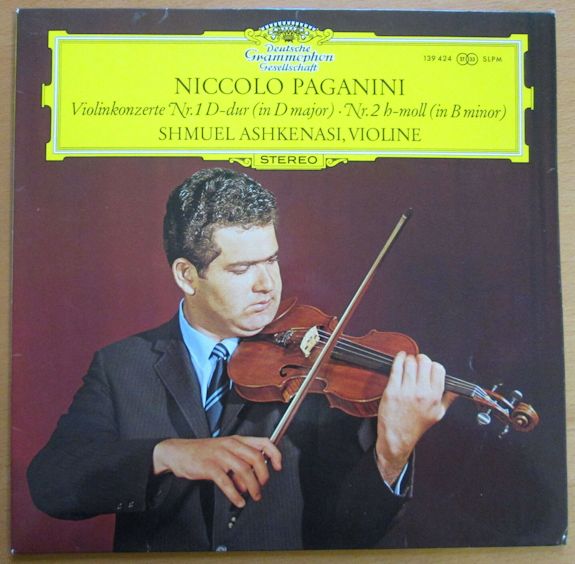 Richard: Usually they are better.
Certainly, there are exceptions. We’ve all played Strads,
or Amatis, or Guarneri, the designer labels, some of which don’t sound
so good, but that’s really the exception rather than the rule. A
lot of times when I’ve played a big name instrument that I didn’t
care for so much, I would bet that in most cases I would like it better
if it were setup and adjusted more to my taste.
Richard: Usually they are better.
Certainly, there are exceptions. We’ve all played Strads,
or Amatis, or Guarneri, the designer labels, some of which don’t sound
so good, but that’s really the exception rather than the rule. A
lot of times when I’ve played a big name instrument that I didn’t
care for so much, I would bet that in most cases I would like it better
if it were setup and adjusted more to my taste.
BD: Like moving the sound post around,
or something like that? [Note that the recording shown at
left has the Vienna Symphony Orchestra conducted by Heribert Esser.]
Richard: Move the sound post, make
the bridge higher or lower, use different strings, and so forth.
For example, the Zino Francescatti Strad. I saw it once
in a shop in New York, and it had an impossibly high bridge. I
don’t know very many people that could play an instrument with such
a high bridge. It means the strings are so much higher off the fingerboard,
so you have to press more.
BD: Then when you get way
up into the high positions, you’re having to press down very hard.
Richard: Yes, exactly. But he
was so used to it. It was his fiddle, and he just didn’t want
to change because, when you lower the bridge, it does change the response,
and also the quality of the sound. He just liked how it felt and
how it sounded, but it wouldn’t suit too many people.
BD: You two are members
of a quartet. Do you try to get instruments that will sound
best together as a quartet, or do you still try to have four individual
sounds?
Shmuel: We try for both. It depends
on the score. We each try to have an instrument that will blend
well, and have an individual characteristic at the same time. I
want to go back to the question you asked about the old instruments.
One point that deserves to be made, and what I find the most fascinating
and extremely interesting is the fact that those instruments which were
made 250 to 300 years ago were made for literature and halls that did
not demand a big sound. Nevertheless, they are chosen today even
for those characteristics. So, when you ask about all the Stradivariuses
and all the Amatis, I haven’t seen them all, but all that I’ve seen certainly
are superior instruments for the qualifications of the time. They
didn’t have big halls. They didn’t have the big romantic concertos.
They didn’t have the big orchestras, so they didn’t need really
a very big sound. They needed to find quality and evenness in their
sound, and they all have that. If they don’t, very often it is
because next to none of these instruments have been not tempered with.
A lot of wood has been taken off, and the neck has been modernized,
and they’ve been souped up to sound louder.
BD: And they have been put together
with new glue. I was led to believe at one time that they thought
it was the glue that Stradivarius used that made them special.
Shmuel: I don’t think that makes any
difference. If it makes a difference, it is such a small difference
that it couldn’t be audible.
BD: It’s not going to change the resonance?
Shmuel: I don’t believe so. I
may be wrong, but experiments have been done. If you press on
the ribs of the instrument, I don’t think it makes much difference.
BD: We’re talking about old instruments
playing old music, yet we’re still playing old music today in concert
halls large and small. Has the way that you produce music, basically
the same notes, changed for Twentieth century audiences, now as we head
into the Twenty-first century? You don’t
play Vivaldi for Vivaldi’s audience. Now, you’re playing Vivaldi
for a post-World War II audience, so it’s going to be a completely different
kind of thing. Do you play it differently because our ears are
different?
Richard: At the risk of sounding like
we don’t care about the audience — because
we do care a great deal — I don’t
think we play one bit differently for one audience or another because
it’s a modern audience as opposed to a different taste of back then.
We try to play what’s in the score, period. We try to bring
as much of ourselves as we can to bear on the music, whatever music it
is that we play. But the overwhelming governing factor that imbues
all of our work is what’s in the score. The same stuff is in the
score now as it was in Beethoven’s time, notwithstanding all the new
editions that we have.
 Shmuel: I will say that there is an influence on the
audience that is sort of back-door, and that is, unfortunately, the
influence of the recording industry. The recording industry caters
to the audience, and that process changes tastes
— sometimes to the good, often to the bad.
Shmuel: I will say that there is an influence on the
audience that is sort of back-door, and that is, unfortunately, the
influence of the recording industry. The recording industry caters
to the audience, and that process changes tastes
— sometimes to the good, often to the bad.
BD: Does the audience influence the
choice of repertoire?
Shmuel: Yes, also.
BD: As the Vermeer Quartet, which of
you decides, or is it the four of you collectively that decides what
will go on each concert, or on each recording?
Shmuel: We do it always together. In
fact, we may be unique in that we have an unwritten rule in this group
that we will not play a work that all four of us don’t love.
BD: Each man has a veto?
Shmuel: Yes.
Richard: No majority rules in our quartet.
BD: It’s all or nothing.
Richard: That’s right.
Shmuel: Unfortunately, for other groups
such as string trios, they cannot have this because they don’t have
any repertoire because it’s so limited. Fortunately for us,
there are so many great masterpieces that we all love, that we never
run out of works that we all will agree to play.
Richard: We are influenced by the audience,
but certainly by the auspices that we play for. We have to play
a large portion of the repertoire that’s the meat-and-potatoes of
the repertoire, only because the presenting societies demand it. That’s
how they sell their series, and they expect it. Most of our work
that we offer on tour centers around the masterpieces of Beethoven,
Mozart, Schubert, Schumann, and so forth. But we try always to
sneak some other things in there, and always something from the 20th century.
It is not necessarily brand-new — although
we have played some brand-new things — but
we try to stretch the ears a little bit here and there. It’s
good for us, too.
BD: Do you feel that each concert should
be an enjoying experience as well as a learning experience?
Shmuel: Absolutely.
BD: Then where should be the balance,
in either a piece of music or in the whole concert, between the artistic
achievement and entertainment value?
Shmuel: I don’t know that I would call
it an ‘entertainment value’
necessarily. One can enjoy it without it being entertaining.
One can be very moved and enjoy it that way. If it is a
very sad piece, you can enjoy it, and it’s not entertaining as such.
BD: Enjoy the sadness?
Shmuel: Enjoy the sadness, but ‘entertainment’
suggests that it must be always fun, or joyous, or even comic.
BD: Or frivolous?
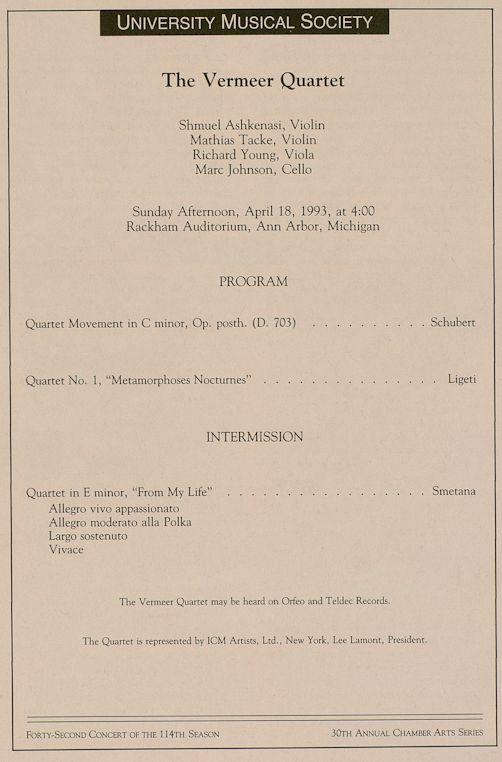 Shmuel: Or frivolous, yes. Of
course, there is that element in music as well, but I don’t think
we would play a work that is offbeat or unknown just for its own sake.
Usually, we try to resurrect neglected works, or discover works
that are just not known, and are too good to be neglected.
Shmuel: Or frivolous, yes. Of
course, there is that element in music as well, but I don’t think
we would play a work that is offbeat or unknown just for its own sake.
Usually, we try to resurrect neglected works, or discover works
that are just not known, and are too good to be neglected.
Richard: Very often, we get advice from
loyal sponsors. There’s one man in particular that has been
very loyal to the quartet in Germany, who suggested we learn the first
Ligeti quartet. I’m quite sure we would not have learned it otherwise.
We trusted him, and trusted his judgment, and it turned out to
be just a dynamite piece. We carried it all year long, and it was
a real good experience. It was very successful as far as the
audiences were concerned.
BD: Since you carried it for a season,
is it likely to come back in another season?
Richard: Yes.
Shmuel: Yes.
BD: Does your experience with the first
quartet make you curious to want to learn the second quartet?
Shmuel: Very much so, but we will listen
to it. As a group, we are a distance away from learning it.
We may, and we may not. We have to convince each other that
it’s worthwhile.
Richard: Right now, we’re deciding
on the programs for the season after next. There’s a Max Bruch
quartet... he did write something other than the G Minor Concerto
and the Scottish Fantasy! There are actually three quartets.
BD: When someone says to take a look at
this or take a listen to that, what is it that you’re listening for?
What is it that’s going to decide “yes, we’ll do it,” or “no,
we won’t do it”?
Shmuel: There must be an immediate
appeal, especially if it’s a work that is more than forty or fifty
years old. It must have some originality. It must say something
new, or it must be an old thing in a new way, or in a marvelous way, or
in a moving way. It has to have value. You have to be seduced
by the music.
Richard: Next season, we’re playing a
quartet of Jacques Ibert. I don’t know of another quartet that’s
playing it. Pierre, our second violinist, heard the recording
on some offbeat label, and took a liking to it.
Shmuel: We all listened to it, not
from the beginning to the end, but to a bit of each movement just
to see that there’s no boring slow movement, or a trivial section. Then
we decided to chance it.
BD: Is the Vermeer quartet in a position
that it can play such a French piece in a French way, or do you just
play it in a musical way?
Shmuel: I don’t know what ‘French
way’ means.
Richard: [With a smile] We do
have a French Canadian in our group. Does that count? [Laughter
all around] It’s close.
Shmuel: We try to interpret the music
to its originality, and since it is French, it becomes part of the
French culture. Hopefully, it will sound to French people like
we play it in a French way, but I don’t know exactly what that means.
The music says it’s better.
BD: [Gently protesting] But you
wouldn’t play it and approach it the same way as some of the Beethoven
quartets.
Shmuel: We would approach it the same
way, but something else will come out. We also approach the
Beethoven quartets different one from the other, but I understand what
you’re saying. There is a Germanic approach, and certainly Italian
music should be played differently. But the music says that, and
hopefully we pick it out. We don’t play different works the same
way.
BD: Is that the individual genius of
Ibert and Beethoven?
Shmuel: I would imagine so, but the
individual genius was also influenced by the culture and heritage.
It comes back to nationality, and geography, and climate, and
culture.
Richard: There is such a thing as a stereotypical
French string sound. I guess that stereotype would suggest that
you play over the fingerboard, or you use wispy pastel colors, but
that, too, can become its own stereotype. It can become a cliché
if you just superimpose it over every bit of French music that you
approach. You really have to take each movement, each phrase,
each bar on its own merits and find the right sound, whether it’s a piece
of French music, or German music, or whatever.
BD: [With a wink] You don’t picture
a Parisian cafe, as opposed to a German beer hall?
Richard: [Smiles] Sometimes it
does help. There’s a use for literal images. If I’m having
trouble finding out what the music means, not often, but sometimes
it does help to try to put yourself in another frame of reference.
* * *
* *
BD: Have you, as a quartet, commissioned
new works?
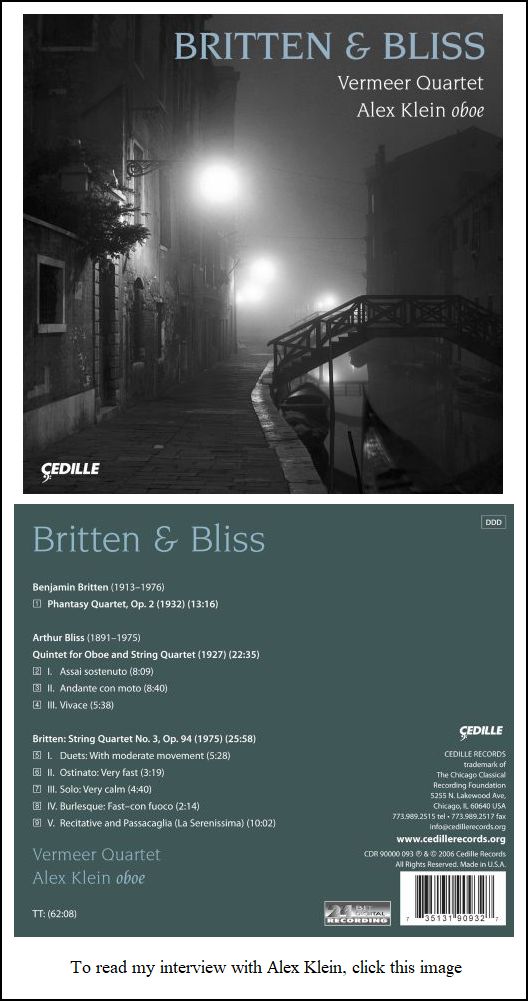 Shmuel: We were involved in the commission of a
quartet of Ezra Laderman,
but we were not the only quartet involved. It was his Fifth
Quartet, and a few quartets were involved in the commission and
performing. The idea was that it shouldn’t be performed just once
or twice, but it should be performed all over the country simultaneously.
Shmuel: We were involved in the commission of a
quartet of Ezra Laderman,
but we were not the only quartet involved. It was his Fifth
Quartet, and a few quartets were involved in the commission and
performing. The idea was that it shouldn’t be performed just once
or twice, but it should be performed all over the country simultaneously.
Richard: We’ve also been involved in
performances that of works which were commissioned for us by other
presenting organizations. For example, Chamber Music Chicago
commissioned the Sextet [for Clarinet, Piano, and String Quartet]
of Dick Hyman (in 1988), and next season, there’s going to be a work
by Steven Mackey [On All Fours, premiered May 16, 1990] that’s
being commissioned for us to play.
BD: For these works, you’re presented
with a piece that you have to play?
Shmuel: Yes, and often it’s a problem.
This would be very much the exception to our rule, but if too
many arms are twisted, we will yield occasionally. It has to
be for a good cause, so even if we grow to hate the work, at least
we know that it’s in a good cause, like encouraging young composers. The
benefits often will justify us having to do the work.
BD: What advice would you have for
a composer who was writing a quartet or a chamber work for you?
Shmuel: For me, the first thing I would
say is that it should be written for what I was trained to do.
BD: That is to play beautiful sounds?
Shmuel: Not necessarily beautiful.
There is beauty in ugliness too, but literal demands and instrumental
demands that I was not trained to do make me feel incompetent....
like speaking, or singing, or shouting...
Richard: ...or hitting the back of
the instrument with your bow.
Shmuel: Yes. There are so many
effects. I’m not against finding new sounds, and I don’t think
that what we have is necessarily the ultimate, but I don’t feel qualified
to perform it unless I study it. The other thing is that it must
be alive. I don’t think that it should be difficult for its own
sake. Practically every new work that we’ve done was very difficult.
If it’s a great work, you justify the difficulty, but if it isn’t,
you feel that it’s difficult for its own sake, and that gets really cumbersome.
Richard: You don’t find how good the piece
is until you’ve invested so much time and effort. You’re delighted
when you find out that it’s worth all of that trouble, but more often
than not, for one reason or another, it’s not. I don’t want to
give the impression that I, or we, are not always looking for something
that’s original, something new, because the group wants to do new works.
But if you ask for advice, what we could tell other people who are
interested in writing new quartets is that not all composers, or not many
composers, really know all of the possibilities that even Beethoven explored.
They are writing without a full working knowledge of what’s possible
for a quartet, and instead they come up with new things or new techniques
that are sometimes valuable, sometimes not, but they don’t know the existing
vocabulary.
BD: Even in old masters, do you sometimes
feel that some of the composers are writing little symphonies rather
than great chamber works?
Shmuel: I personally don’t feel that there
is much difference. It’s only a difference of orchestration, but
it’s all chamber music — not in the
sense that amateurs get together and sight read, but in the sense that
there is an interplay between voices, and counterpoint. When I
play solo pieces of Bach, I find that is also chamber music, even though
I’m doing it alone. When I hear symphonies of Bruckner or Mahler,
these, too, are chamber music, in the sense of the interplay of voices.
It’s orchestrated differently, but I don’t find that Beethoven
piano sonatas and symphonies are all that much different.
BD: Do you find a difference when you’re
playing a solo concerto in front of an orchestra, as opposed to four
men playing in the chamber group?
Shmuel: There is a difference, but it’s
in the form. It’s a Concerto Form, with the exposition repeated,
and that sort of thing. The quality of the music may be more showy,
such as an elaborate cadenza before the recapitulation at the end of the
movement. Many quartets do not have that, and many symphonies
also do not. Some do, but I don’t find that the content and the structure
of the music is all that much different. Indeed, Beethoven rewrote
works in certain combinations for other combinations presumably because
they would sell. He was considering that, as well.
BD: Are you conscious of the fact that
you want the Vermeer quartet to sell?
Shmuel: Yes.
Richard: We’re certainly made conscious
of that concept.
BD: Does that enter into the artistic
decisions?
Richard: Not at all.
Shmuel: Never.
Richard: We all know a lot of musicians
who were trained to do things that would project in such a way as
to make a popular impression, and we resist that.
* * *
* *
BD: Earlier we mentioned recordings. Do
you play differently in the recording studio than you do in the concert
hall?
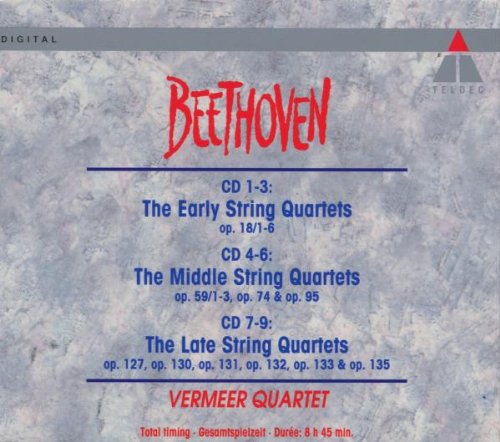 Shmuel: Unfortunately, yes.
Shmuel: Unfortunately, yes.
Richard: Yes.
BD: How so?
Richard: [Quietly laughs] God,
there’s nothing harder to do than make a recording. We’ve all
been trained since we were very young to play for an audience, and
the reward, after all of the work, is to play it all the way through
in public. It’s a very festive occasion, and something that we
all are geared to do. But the recording situation is different,
and maybe it’s just because we haven’t all done it since we were ten
years old. It’s relatively new for us, but it’s a very unnatural
situation. I’m sure any artist would tell you this.
BD: There’s no truth to the idea that
you can just sit there and do it again, and again, and again until
you get it just the way you want you it?
Richard: When you play a passage and you
screw it up, you know that you have unlimited chances to go back and
do it again. But the more you go back and do little pieces of
things, subconsciously you become more safe in the way that you play,
and you become more self-conscious. As a result, you don’t play
as well... at least I don’t, and I think our quartet does not. Going
back, and back, and back, and nitpicking does not really help. Certainly
musically, but also technically, we probably play as well or better on the
stage than we do in the studio, even though we should know that in the
studio we can always go back and pick up the mistakes.
BD: In the studio, don’t you just simply
play it through?
Shmuel: We do.
Richard: We do. We try to, and
the producers know us by now. This is a common tendency, and
they force us to play things through, or play large portions of things,
even when one or more of us may say, “But what about three measures after
letter C? I missed something there.” But still, there’s just
that human element involved, and you know that the microphone is there
staring you in the face. You think that this is the one time you’ve
got to get it right. All your friends are going to hear this, and
regardless of who’s going to hear it, this is the one version that you’re
going to hear again.
BD: That’s different than knowing all
your friends are in the audience?
Richard: That’s right.
Shmuel: It’s actually a serious state of
affairs, which was caused, perhaps, by the recording industry. Because
the emphasis on technical competence — indeed
perfection — is so overwhelming,
that almost all the shadings, and more-important elements of a performance
are erased.
BD: Despite it all, have you basically
been pleased with the flat pieces of vinyl that have been issued?
Shmuel: Sometimes yes and sometimes no.
To begin with, there’s a compromise in the sound. There is only
so much that you can do in that particular studio, with that particular
microphone, with that particular set of equipment, and those particular
speakers. I’ve had the phenomenal experience of loving a recording
on a set of speakers and equipment, and hating the same recording on another
set. In fact, I found that it influenced the tempo, which obviously
remained the same.
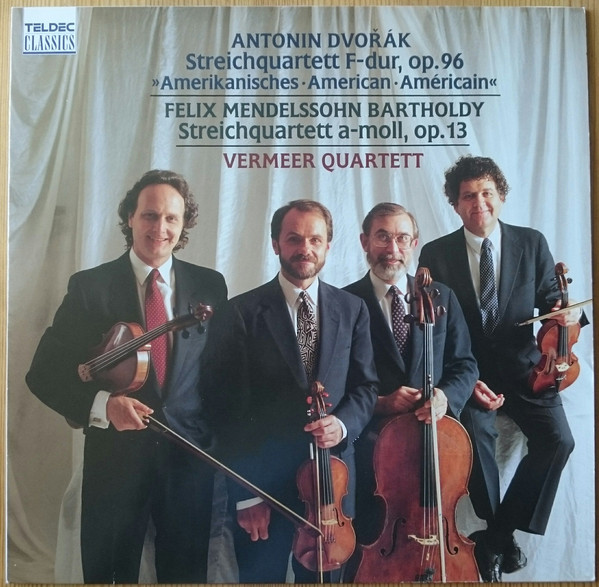 BD: On one set it was too fast,
and on another one it was just right?
BD: On one set it was too fast,
and on another one it was just right?
Shmuel: That’s right. On one
it was very dry, and everything seemed slow.
BD: Is it not some comfort to know
that each individual, on his or her home stereo, is going to adjust
it to their liking?
Shmuel: Yes, it is of some comfort, but for
this whole generation there is an over-emphasis on technical perfection.
Mind you, I’m very much for playing perfectly, but not to the expense
of structurally being sound, and emotionally being one with the music.
That is not possible. You asked about doing it over, and over,
and over until you’re pleased. What you cannot do is do it the first
time. That is something that you cannot do the first or second time,
and by that later time, you’re spent. Moreover, you cannot record
the whole movement over and over. Logistically, it’s not possible.
So, you don’t have the structure in front of you. You have
to do little bits.
BD: You get good takes of the whole thing,
and then insert little patches?
Shmuel: That’s exactly what we do.
Richard: When we recorded the A
minor Quartet Op. 13 of Mendelssohn, we spent two or three days
in the Teldec studio in Berlin. It was just a coincidence, but
right after we finished that recording, we had been hired to play a radio
taping of the same piece across town in for German Radio. Of course,
the last thing we wanted to do after going through bloody hell with this
damn recording for Teldec, was to do the same piece the very next day.
When you record for the radio, they do some editing, but it’s minimal.
BD: Basically, they let it go unless
it falls apart?
Richard: Yes. It was an extraordinary
experience for me and for us. We went there after finishing the
recording, and I don’t think we ever played it better. They did
one minor insert, and that was it. We were just so relaxed. There
was something about having been told that previous day by that voice
of doom over the speaker (the producer in the booth) saying, “It is still
not together. Still out of tune.” So, for the radio there just
wasn’t anything that we didn’t know about existing problems, or tendencies
that we had in that piece that we couldn’t somehow account for.
BD: Would it have been good, then,
to go back across town once more and do it that way for Teldec?
Shmuel: There are too many variables.
The studio where we record doesn’t sound all that good to begin
with.
BD: [Surprised] Why do they put
up with that???
Shmuel: [Laughs] They own it.
It saves them money. There are so many factors. It
has to be relatively quiet, and not have airplanes, and subways, and
traffic, and that sort of thing. Also, it has to be good for recording
more things than just us. In some halls, it sounds well but it
doesn’t do so well on the recording. That radio studio sounded much
more flattering than the other one. But then, we did have the experience
of having rehearsed, and done all of the things, and even though I agree
with Richard that it felt awfully good, and it may well be the best
we ever played it, it wasn’t good enough for the recording.
Richard: I’d like to hear the tape
and compare it with the record. Of course, they wouldn’t have
let us leave the country if it wasn’t right. Earlier, when
you were talking about instruments, Shmuel mentioned how important is
the quality of the sound of the room itself, and the ambiance of the
room. I was told that the studio where we did the radio taping,
was the oldest recording studio for classical music in the world.
There was something about the sound of that room that was just so inspiring.
It was not any bigger than the studio that we had for Teldec. It
was about the size of a small high school gymnasium. It had high
ceilings, and a lot of wood just like the Teldec studio, but there’s
something about the character of the sound there that was special. It
put greater responsibility on the players to play well.
* * *
* *
BD: I asked before about advice to composers.
In all of this thinking about performing, what advice do you
have for young quartets, or even young individual players?
Shmuel: I have usually two paired answers.
The first one is to study the score. There is no substitute
for that, and it cannot be done enough. The other bit of advice
that I have is for the individual members. If they want to contribute
to their group, they should practice their parts. Those two elements
are the most important gifts that an individual can give to the quartet.
BD: Then once they come to the quartet, and
they are together as four players, what kind of advice do you have
— assuming they have prepared themselves individually?
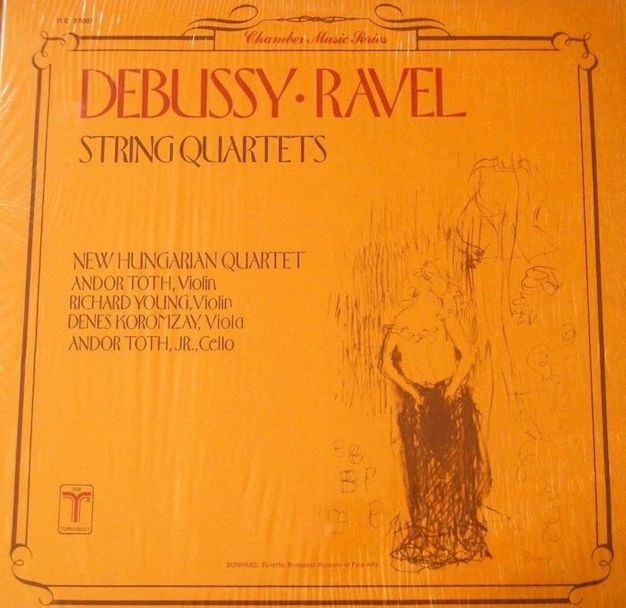 Shmuel: They should love each other.
It’s easy to say and very difficult to do. In quartet
playing, the whole is the sum of the parts. It used to be that you
could hide one or two weaker members in a quartet
— the inner voices — but
today’s standards just don’t allow that. On any level, whether
it’s amateur, or student, or professional, the quartet is going to
be only as good as every member can play individually. Then you
come to grips with a host of ensemble problems, in working things and
balancing intonation within the group and so forth. But you’re
never going to play one chord in tune as a quartet if you can’t play in
tune yourself on your own instrument.
Shmuel: They should love each other.
It’s easy to say and very difficult to do. In quartet
playing, the whole is the sum of the parts. It used to be that you
could hide one or two weaker members in a quartet
— the inner voices — but
today’s standards just don’t allow that. On any level, whether
it’s amateur, or student, or professional, the quartet is going to
be only as good as every member can play individually. Then you
come to grips with a host of ensemble problems, in working things and
balancing intonation within the group and so forth. But you’re
never going to play one chord in tune as a quartet if you can’t play in
tune yourself on your own instrument.
BD: But then you have to come
together and make sure that all four will blend.
Shmuel: Yes.
Richard: When we consider technical
things in our quartet, we work the most on intonation, and voicing,
and balancing of chords.
BD: Who listens for that
— the individual members, or is there a fifth
set of ears?
Richard: It’s just the four of us.
We’d all like to think that we are able to separate ourselves
from our menial parts, and listen objectively as if from the outside.
Very often, when we listen to tapes or recordings, we can be a little
more objective because we’re not also playing our instruments and parts.
We have to train ourselves to listen not only to our part, and to
how that part sounds within the group, but also how it would sound from
outside the group.
BD: Is there ever a case
where the two violinists switch first and second?
Shmuel: Not in our group.
BD: Some groups do that.
Shmuel: That’s right.
Richard: The switching that is involved
is just with the different repertoire. For example, piano quartets
require only one violin, and usually Pierre has first refusal on the
violin part.
BD: [To Shmuel] You don’t feel
like you’re being forced out of work?
Shmuel: No! On the contrary,
I welcome him playing because, first of all, it gives me a break. I
have so many more notes as first violist of the quartet than anyone
else, so I’m delighted not to have to practice more. It’s very
healthy for the second violinist to play as much as possible, because
it gives him leadership and assertiveness qualities to sharpen, which
are very, very important.
BD: But that still isn’t enough to
influence you to play half the concert as first, and half the concert
as second?
Shmuel: No. I am not opposed
to that. I just think that it is not ultimately for the good
of the quartet. You may have the best first violinist and the
best second violinist in the world in a group, but if you switch them,
they may not be the best any more. But it’s possible. There
are very successful quartets who are switching, and certainly psychologically
and logistically it may have a lot of benefits.
Richard: At least in the case of a
couple quarters I can think of, it really does help keep peace in
the family, and that’s important. There’s this standard Second-Violin
Complex, that a person feels he’s not given the opportunities to shine
or project enough.
BD: [To Richard] You were a violinist,
and you switched over to viola. Has playing the inner voice meant
a big change in your psychology?
Richard: Actually, I played second
violin in the New Hungarian Quartet [LP shown above right, and CD shown
below], and I played violin in a piano trio. Now I’m playing
viola in this quartet, so I have had a taste of three of the roles in
a chamber group. [Laughing] Marc’s going to give me some
cello lessons... [More laughter]
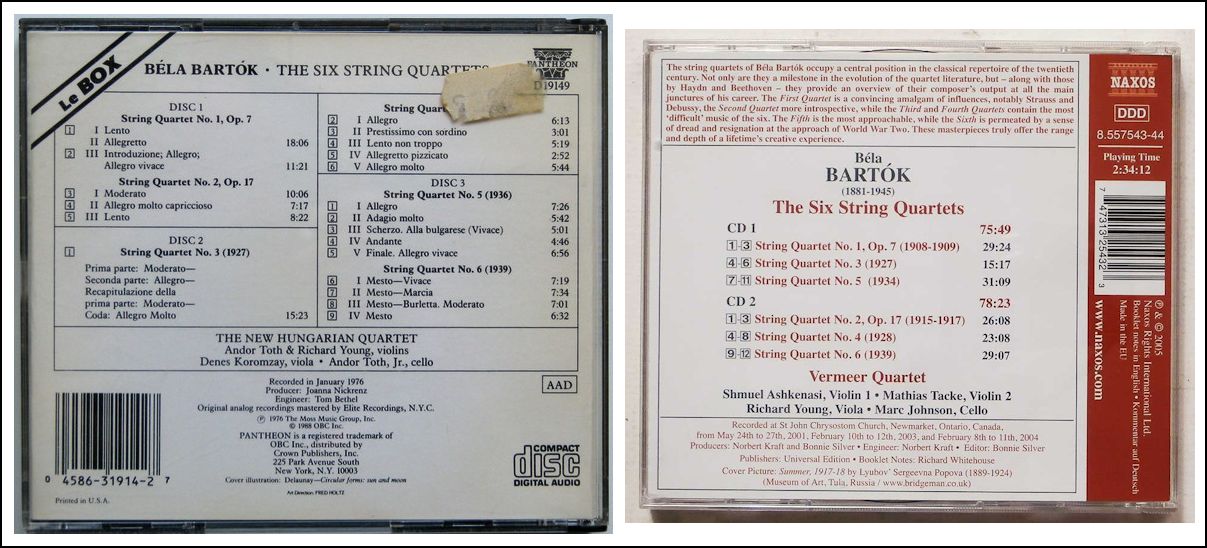
BD: Is it really different playing
the inner voice as opposed to playing the first violin?
Richard: This is going to sound like
a flip answer, but it’s really the truth. One of the things that
was most disorienting for me when I first started playing viola in this
quartet, was simply walking to the other side of the stage to sit down,
and having the audience be on the wrong side of me. I’d
never played viola before. All my life, I had been used to walking
out and sitting or standing in a certain place in relation to the audience.
They were always off to my right, at about the 2 o’clock position.
There’s something just so confusing about walking out to the wrong
place, facing the wrong direction, and still having to feel comfortable
with it.
BD: Both of the violinists have their sound
going out toward the audience. For the violist, if anything,
the sound is going up into the rest of the quartet, or into the wings.
Can you change the position of the instrument at all?
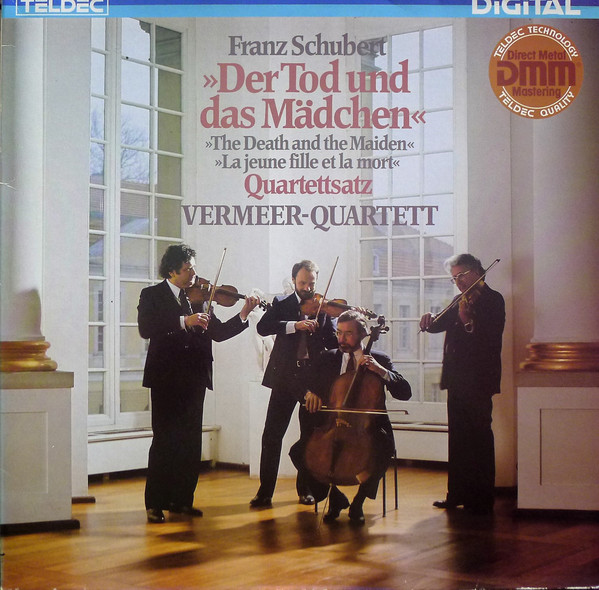 Richard: To be honest with you, I’m
still not real comfortable. It seems that whatever I do, however
I sit, it’s either unnatural, or I’m just not sure how much it does
even matter. A lot of violists turn way out like that when they
duck. They dip the instrument so that the sound will come out through
the top towards the audience more. I’ve tried various things, and
it’s really difficult to know if anything is important.
Richard: To be honest with you, I’m
still not real comfortable. It seems that whatever I do, however
I sit, it’s either unnatural, or I’m just not sure how much it does
even matter. A lot of violists turn way out like that when they
duck. They dip the instrument so that the sound will come out through
the top towards the audience more. I’ve tried various things, and
it’s really difficult to know if anything is important.
BD: Do you then play very slightly
louder to compensate?
Richard: It depends who you ask. I
don’t do it intentionally, or at least not
for that reason.
BD: I assume this would all come
back to the question of balance. If your balance is not good,
then you’ve got to stress it just a little bit more to get out, to
be heard.
Richard: That’s right. The quartet that
had the ideal seating was the Kolisch Quartet. Usually, you
hold the violin with the left hand, and bow it with the right hand.
Because of an injury, he switched, and held it with the right
hand, and bowed with the left hand. What this meant was that
he was able to sit on the right, where the violist usually sits, and
the second violinist was where the first violinist usually is. So,
the two violinists were facing each other, and the violist was seated
where the second violinist usually is.
* * *
* *
BD: Let me get a little history of the Vermeer
Quartet. It was founded in Marlboro. Who were the original
members?
Shmuel: Before we were a quartet,
we looked for a second violinist for most of a whole year. We
played trios, and kept auditioning second violinists until we found Pierre.
In 1970, we became a quartet. I and Pierre were the
two violins, Scott Nikrenz was the violist, and Richard Sher was the
cellist. [Photo of this group is shown farther down on this webpage.]
Since then, we had one more cellist before Marc, who joined us about
five years into the life of the quartet, and he stayed. We have had
quite a few violists, who seem to be an endangered species. [Richard
Young joined the quartet in 1985, and remained through its final concerts
in 2007. LP cover at right shows violist Bernard Zaslav.]
BD: Why is it that violists are an
endangered species in a string quartet?
Shmuel: It’s
not only in string quartets. There just are not so many wonderful
violists around. There are some, but not as many as there are quartets.
Nobuko Imai, who used to be in the quartet, has had
quite a substantial solo career. There is also Kim Kashkashian.
She’s a terrific chamber music player, and she recorded all the Hindemith
solo sonatas recently.
Richard: The best violist these
days is Pinchas Zukerman. Most of the better violists are
chamber music players. It really goes back to the early
training. First of all, I should preface what I’m going to say
by saying that I don’t believe, as others believe, that the standards
are lower for viola than are for violin or cello. I just think that
there are fewer violists who are at that higher standard than there are
violinists and cellists. If you go to any of the public-school music
programs, more often than not, the kids that are encouraged to play viola
are the kids who are not good violinists, or who are somehow physically
awkward, or gangly, or big. They instinctively give them the big
instrument. So, already you have this ‘ugly
duckling syndrome’.
BD: So, really, it’s not the violists
that are shortchanging the music, but it’s the whole system that
is shortchanging the viola.
Shmuel: That’s right. Also, you
have a very big problem with the repertoire. To play in a quartet,
or to play in a great orchestra are the two things that a violist can
strive for. There are no solo careers out there for a violist...
at least none that is within one’s reasonable expectations.
BD: There is Harold in Italy
of Berlioz, and the Walton Concerto. Those are the only two
that I can think of off-hand.
Richard: [With a smile] There
are three and a half concertos for viola, so even if the public demanded
to hear more viola concertos, the repertoire isn’t there.
While preparing this conversation for
posting in August of 2020, I asked Richard to clarify his jest, and in
an e-mail message he replied that there was the Walton Concerto
(which was written in 1929 at the suggestion of Sir Thomas Beecham, and
when it was rejected by Lionel Tertis, it was premiered by Paul Hindemith),
and the Bartók Concerto (of which the unfinished sketches
were completed by Tibor Serly; it was commissioned and premiered by William
Primrose, conducted by Antal Dorati in 1949),
as well as Der Schwanendreher of Hindemith (premiered in 1935 by
the composer), plus the Mozart Sinfonia Concertante for Violin and Viola
(which dates from 1779. The solo viola part is written in D major instead
of E-Flat major, and the instrument is tuned a semitone
sharper (scordatura technique), to give a more brilliant tone. This technique
is uncommon when performed on the modern viola and is used mostly in
performance on original instruments.)
Richard also said there are works by Telemann, Stamitz, Hoffmeister,
and their contemporaries, which are mostly played by students, as well
as a few contemporary pieces. However, he said that Harold in
Italy doesn’t
really count, unless you also say that Don Quixote of Richard Strauss
is a cello concerto!
|
BD: Have you thought of encouraging some composers
that you admire to write a viola concerto?
Richard: Me, personally? No.
My life is with the quartet. I do a little bit of playing
outside the quartet, both violin and viola, but I have my hands full
as it is. I learned the standard viola repertoire in order to
teach my students, but I’m not a frustrated viola soloist.
BD: Are you a frustrated violinist?
Richard: No, I play enough violin,
so that it’s like getting out on the road and taking a spin. Then
I come back for the nitty-gritty in the quartet.
BD: When you play violin and viola,
how long does it take to adjust to the size, and the positions, and
everything else?
Richard: I’ve played violin and viola
on the same program, so I’m well-practiced on both. It’s not a
problem to switch.
BD: Irving Ilmer told me that
George Perle wrote a
piece which calls for both instruments. [Irving Ilmer was violist
with the Fine Arts Quartet from 1952-63, and was my next-door neighbor
during that period! Interestingly, two other violists in the Fine
Arts Quartet, which was founded in 1946, were also members of the Vermeer
Quartet before Richard Young.]
Richard: That’s right. I heard Irving
play it, and it’s a good piece. I like George Perle. I
like his music, and played one of his solo violin sonatas, which I liked
that very much. But no, I haven’t played this piece.
BD: [To Shmuel] Have you done
any playing on viola or has it been all violin?
Shmuel: I have not done any playing
on the viola professionally. When doctors and lawyers ask me
to play chamber music, I make sure to play the viola.
BD: Why?
Shmuel: Because I’ve done all of these
parts playing first violin with great players, my colleagues.
Now, to play those great works with people who are not as competent
doesn’t do much for me right at this point.
BD: Is the viola part a little more
of a challenge to you, and does it put you a little closer to their level?
Shmuel: Yes, it does. I’m not
very well-practiced on the viola, and I don’t read the clef that well,
so I feel there is a little bit more closeness.
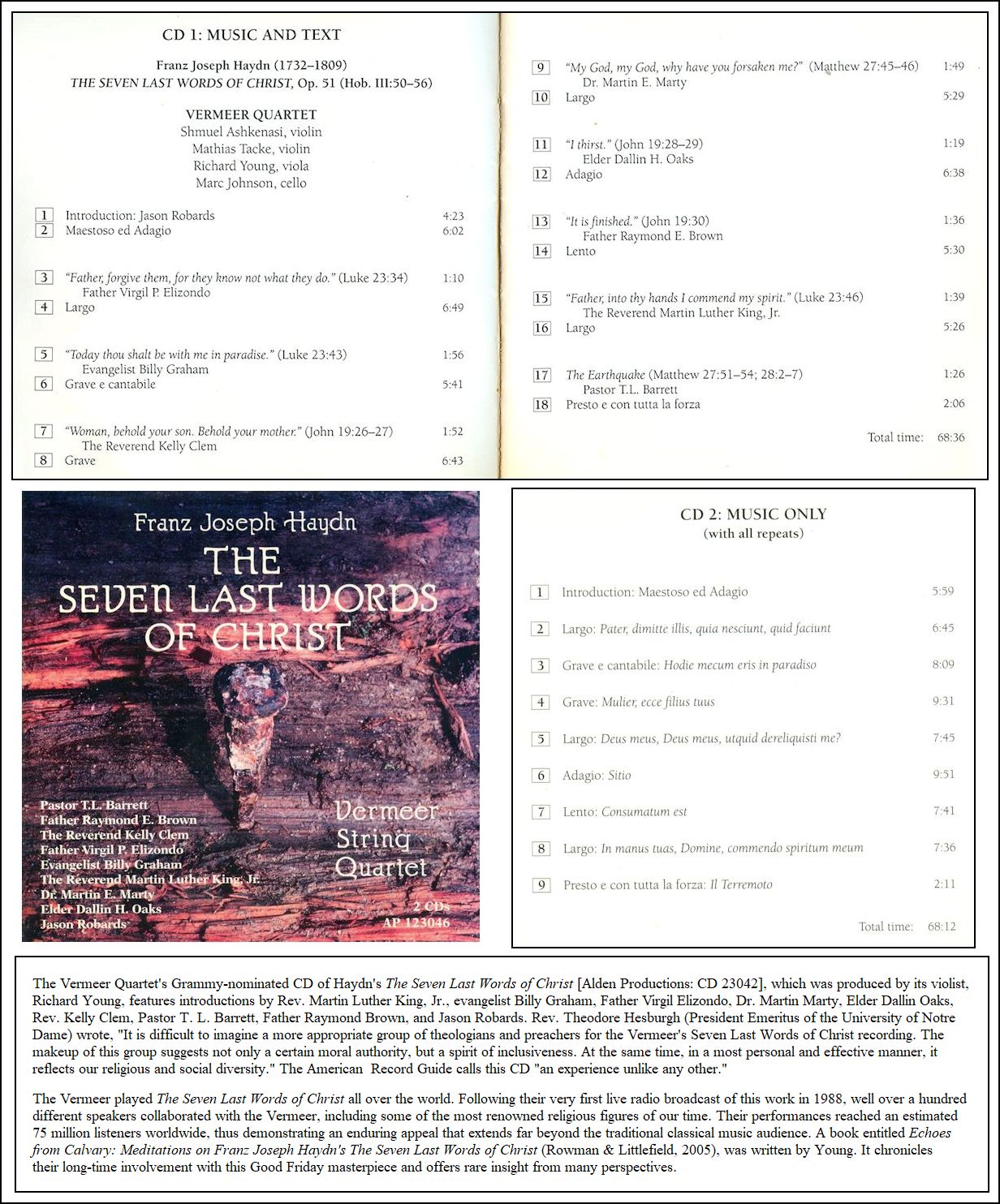
BD: What else do you do besides quartet
playing? I understand you play a mean game of tennis...
Shmuel: I don’t know if it’s mean.
[Laughs] It’s getting gentler and gentler all the time.
I play a lot, and I watch a lot. I love the game. I love
the sport. I like to play, and I like to watch.
BD: Should we try to get the people
who play and watch tennis to come to Vermeer Quartet concerts?
Shmuel: We should try to get any people
to our concerts.
Richard: There’s a whole region of people that
Shmuel knows through his tennis connections, and I wouldn’t be surprised
if some of them don’t even know that you’re a violinist. [Laughs]
They probably think you’re an accountant.
Shmuel: Most of them do know that I’m
a violinist...
Richard: ...but when the phone rings in
your house and they ask Sam, not Shmuel, then we know it’s a tennis
date.
Shmuel: That’s right. [Laughs]
BD: Do they come and support the concerts
at all?
Shmuel: Some of them do. I let them know,
and if they can, more often than not, they do come.
BD: Are the people who play tennis
after working a long day, or on their day off, conscious of the fact
that a quartet will spend hours and hours rehearsing before they spend
two hours playing a concert?
Shmuel: I’m not sure that they’re really
conscious of the fact. I tell them, and then they believe me,
but I am not sure that they are aware of it. In fact, I’m not
sure that many musicians who don’t do this regularly are aware of the
hours that it takes to get proficient at playing quartets.
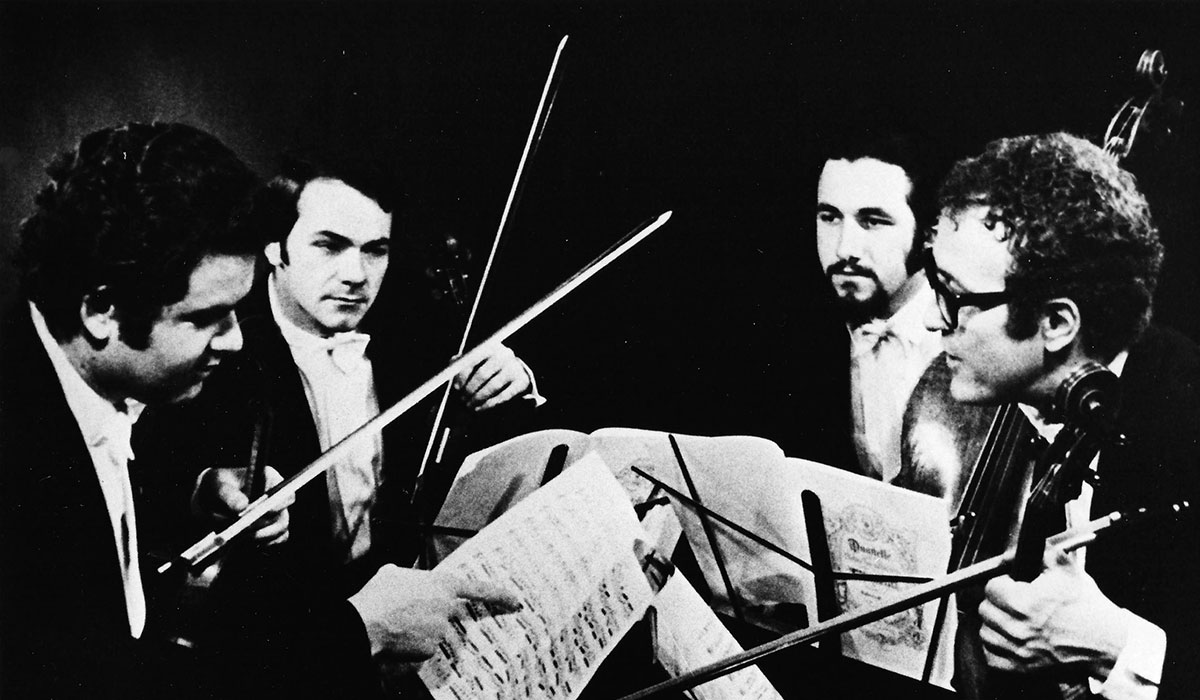 One of the first photos of the Vermeer Quartet
One of the first photos of the Vermeer Quartet
BD: How many concerts does the quartet
give each season?
Richard: This last year, it was around
eighty.
BD: And how many days did you rehearse?
Shmuel: Gosh, I would say we rehearse
more than 300 days.
Richard: We rehearse every day. One
day a week we teach, so we don’t rehearse in order to teach.
Shmuel: Occasionally, we take a day
off in the week, and occasionally we take vacations. But other
than that, we rehearse.
Richard: When we’re on tour, we go to Europe
two or three times a year for two to three weeks at a time, and we
even rehearse on the road sometimes when we’re playing at night.
BD: Do you get enough rehearsal?
Richard: It’s never enough. We carry
these pieces all season, and they still don’t behave. There’s
always something to criticize. One of my favorite quotations is
from Jascha Heifetz, who said, “There’s no such thing as perfection,
because once you attain a certain standard, only then do you find out
that it’s not good enough.” Every quartet player’s motto is that
you think you’re making some progress, and then you realize that compared
to what the score deserves, it’s still unworthy.
BD: And yet you go out there and present
it to the world.
Richard: We do our best, and we work
very hard in order to be as well-prepared as we can. Especially
with our group, our interpretations are always evolving. We’re
always trying to find better ways, better sounds, better techniques. Maybe
we find a new insight here or there, but we don’t let things stagnate.
BD: Even if you could rehearse for
days, and weeks, and months for each individual concert, it wouldn’t
help?
Shmuel: There is a time when you get negative
dividends, because rehearsing a lot does affect the social inter-relation,
and that then creeps back into the playing. When you don’t get
along as well, you don’t play together as well. A fine balance
has to be found between adequate rehearsal time and over-rehearsing. When
you just don’t want to be there anymore because you’ve hashed it to death,
then it’s time to stop. The reason we don’t rehearse too much
on tour is because we have learned that it does more harm than good very
often.
BD: Do you always rehearse in the same
place?
Shmuel: Most of the time we are in
my apartment, and sometimes in Pierre’s apartment when it’s convenient.
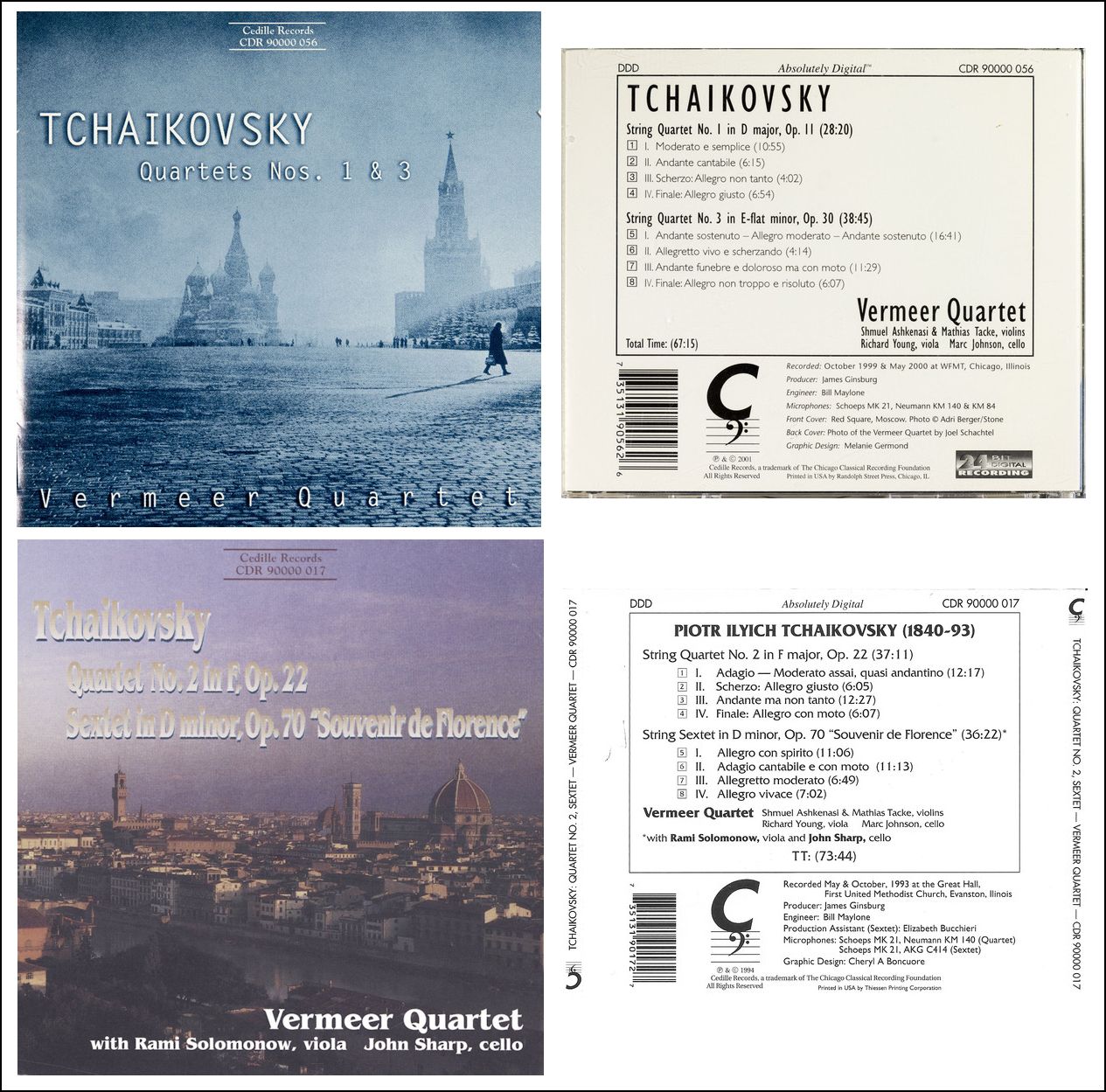
BD: Is playing string quartets fun?
Shmuel: It’s fun at the highest level. I
can’t imagine anything that is more fun than being with music, and
I can’t imagine anything being more fun in music than string quartets.
So, it is fun, but it’s very costly at the same time.
Richard: I would answer it in the same way.
Maybe ‘fun’ isn’t
the right word. ‘Rewarding’
is more the word I would use, but you have to put up with a great deal
of things that are emotionally very costly. Imagine going to
what we do every day at least six days a week. Each of us goes to
a rehearsal, which is a meeting with colleagues who know our strengths
and take them for granted, and who know our shortcomings, so they go
for the jugular as far as that’s concerned. I know that when I go
to rehearsal I’m going to be criticized by a panel of experts. How
many people, when they go to work every day, are subjected to that kind
of thing? All of us feel that, and all of us feel the social pressure.
That is very much a part of any string quartet. It almost makes
playing for an audience child’s play, compared to the pressures that
every string quartet has to deal with just within the group.
Shmuel: That in itself also has its good side.
I haven’t had a violin lesson in over twenty-five years, but I
am getting an awful lot of them every day. I’m grateful for
three sets of ears not letting me get away with it if I’m playing out
of tune, or if I’m scratching. Some of the criticism is justified,
and some of it may be less justified, but be that as it may, it is very,
very good to know that I have these ears to keep me honest, and to see
that I maintain a standard.
BD: That makes you a better player?
Shmuel: It certainly does.
Richard: All of us collectively makes
the quartet better.
Shmuel: I would imagine that it must. Sometimes
we play for audiences that are really not quite worthy of the great
literature that we present. It’s not very often, but it happens.
But nevertheless, at least I know that in that audience are three
people that are worthy, and I’m playing with and for them. That
in itself, the quality of that part of the audience, maintains the standard
of integrity, and that is very rewarding. I don’t know many professional
people who can say that.
BD: Thank you for all of the music, both live and on
recordings.
Shmuel: Thank you.
Richard: Yes, thank you.
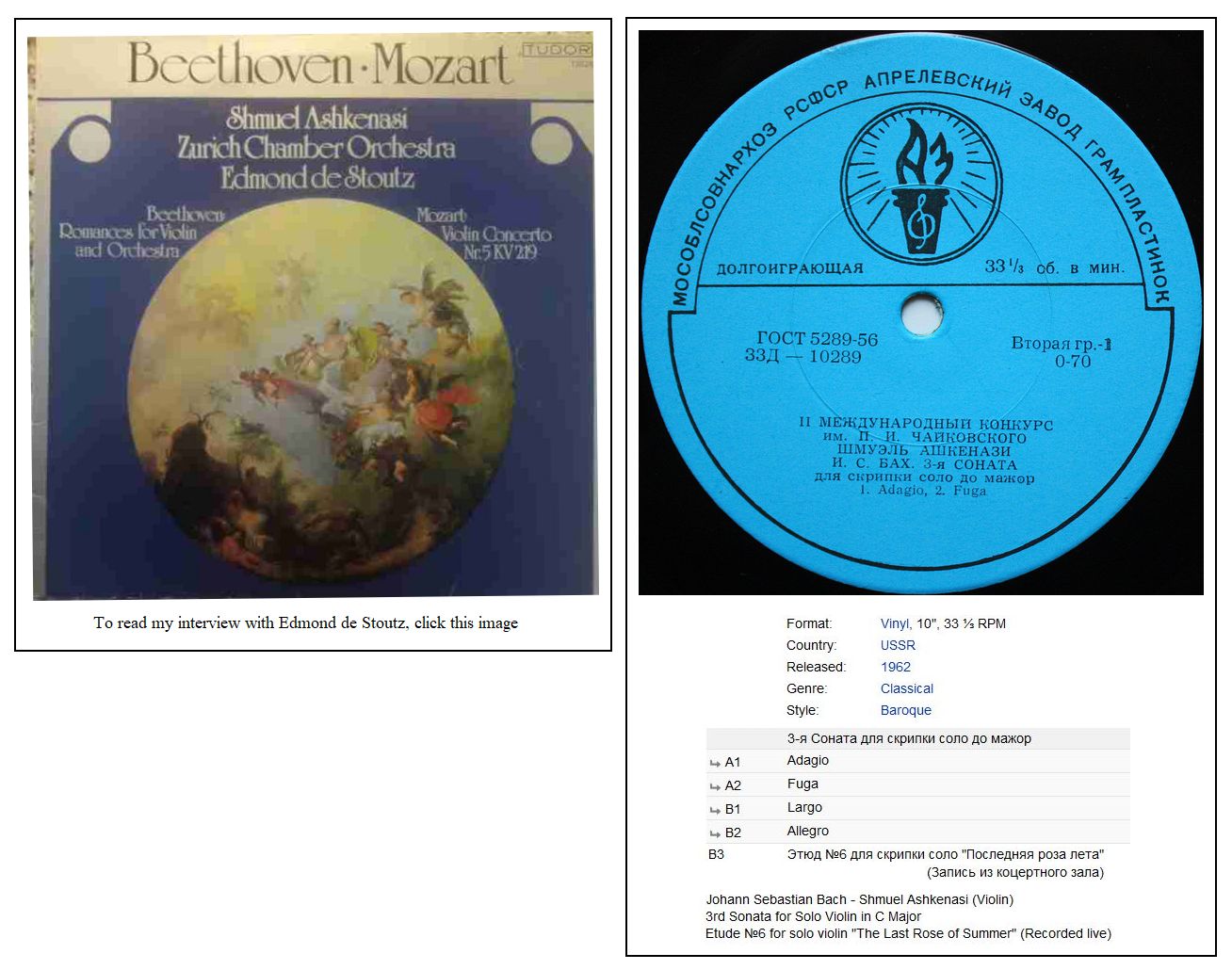
© 1989 Bruce Duffie
This conversation was recorded in Chicago on June 21, 1989.
Portions were broadcast on WNIB two months later. This transcription
was made in 2020, and posted on this website
at that time.
To see a full list (with links) of interviews which have been transcribed
and posted
on this website, click here. To
read my thoughts on editing these interviews for print,
as well as a few other interesting observations, click here.
* * * *
*
Award -
winning
broadcaster Bruce Duffie was with WNIB, Classical
97 in Chicago from 1975
until its final moment as a classical
station in February of 2001. His interviews
have also appeared in various magazines and journals
since 1980, and he now continues his broadcast series
on WNUR-FM,
as well as on Contemporary
Classical Internet Radio.
You
are invited to visit his website for more information
about his work, including selected
transcripts of other interviews, plus
a full list
of his guests. He would also like to call your
attention to the photos and information about
his grandfather,
who was a pioneer in the automotive field more than a century ago.
You may also send him E-Mail with comments,
questions and suggestions.
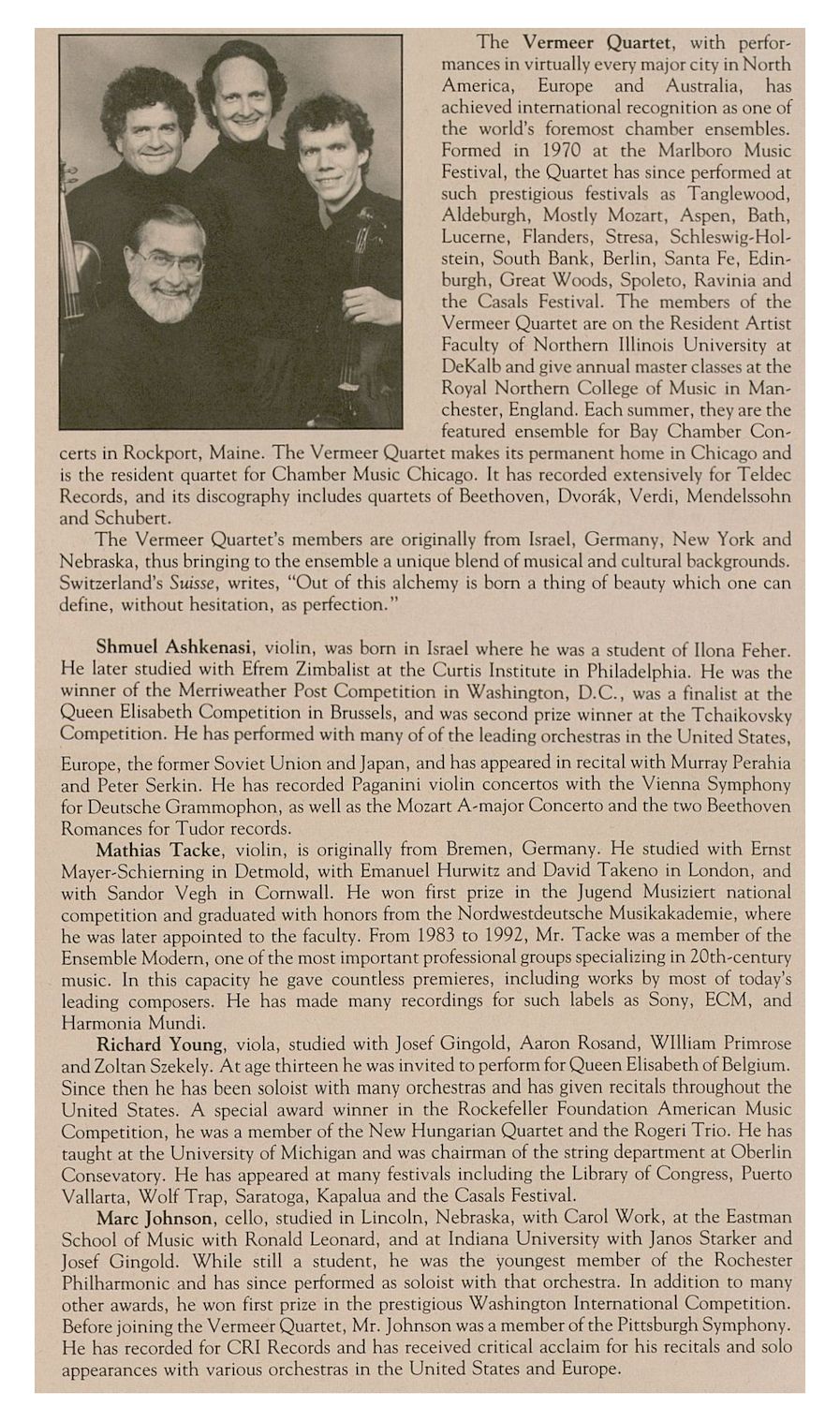
 Bruce Duffie: How often do bows have to
be re-haired?
Bruce Duffie: How often do bows have to
be re-haired?  Richard: Usually they are better.
Certainly, there are exceptions. We’ve all played Strads,
or Amatis, or Guarneri, the designer labels, some of which don’t sound
so good, but that’s really the exception rather than the rule. A
lot of times when I’ve played a big name instrument that I didn’t
care for so much, I would bet that in most cases I would like it better
if it were setup and adjusted more to my taste.
Richard: Usually they are better.
Certainly, there are exceptions. We’ve all played Strads,
or Amatis, or Guarneri, the designer labels, some of which don’t sound
so good, but that’s really the exception rather than the rule. A
lot of times when I’ve played a big name instrument that I didn’t
care for so much, I would bet that in most cases I would like it better
if it were setup and adjusted more to my taste. Shmuel: I will say that there is an influence on the
audience that is sort of back-door, and that is, unfortunately, the
influence of the recording industry. The recording industry caters
to the audience, and that process changes tastes
— sometimes to the good, often to the bad.
Shmuel: I will say that there is an influence on the
audience that is sort of back-door, and that is, unfortunately, the
influence of the recording industry. The recording industry caters
to the audience, and that process changes tastes
— sometimes to the good, often to the bad. Shmuel: Or frivolous, yes. Of
course, there is that element in music as well, but I don’t think
we would play a work that is offbeat or unknown just for its own sake.
Usually, we try to resurrect neglected works, or discover works
that are just not known, and are too good to be neglected.
Shmuel: Or frivolous, yes. Of
course, there is that element in music as well, but I don’t think
we would play a work that is offbeat or unknown just for its own sake.
Usually, we try to resurrect neglected works, or discover works
that are just not known, and are too good to be neglected. Shmuel: We were involved in the commission of a
quartet of Ezra Laderman,
but we were not the only quartet involved. It was his Fifth
Quartet, and a few quartets were involved in the commission and
performing. The idea was that it shouldn’t be performed just once
or twice, but it should be performed all over the country simultaneously.
Shmuel: We were involved in the commission of a
quartet of Ezra Laderman,
but we were not the only quartet involved. It was his Fifth
Quartet, and a few quartets were involved in the commission and
performing. The idea was that it shouldn’t be performed just once
or twice, but it should be performed all over the country simultaneously. Shmuel: Unfortunately, yes.
Shmuel: Unfortunately, yes. BD: On one set it was too fast,
and on another one it was just right?
BD: On one set it was too fast,
and on another one it was just right? Shmuel: They should love each other.
It’s easy to say and very difficult to do. In quartet
playing, the whole is the sum of the parts. It used to be that you
could hide one or two weaker members in a quartet
— the inner voices — but
today’s standards just don’t allow that. On any level, whether
it’s amateur, or student, or professional, the quartet is going to
be only as good as every member can play individually. Then you
come to grips with a host of ensemble problems, in working things and
balancing intonation within the group and so forth. But you’re
never going to play one chord in tune as a quartet if you can’t play in
tune yourself on your own instrument.
Shmuel: They should love each other.
It’s easy to say and very difficult to do. In quartet
playing, the whole is the sum of the parts. It used to be that you
could hide one or two weaker members in a quartet
— the inner voices — but
today’s standards just don’t allow that. On any level, whether
it’s amateur, or student, or professional, the quartet is going to
be only as good as every member can play individually. Then you
come to grips with a host of ensemble problems, in working things and
balancing intonation within the group and so forth. But you’re
never going to play one chord in tune as a quartet if you can’t play in
tune yourself on your own instrument.
 Richard: To be honest with you, I’m
still not real comfortable. It seems that whatever I do, however
I sit, it’s either unnatural, or I’m just not sure how much it does
even matter. A lot of violists turn way out like that when they
duck. They dip the instrument so that the sound will come out through
the top towards the audience more. I’ve tried various things, and
it’s really difficult to know if anything is important.
Richard: To be honest with you, I’m
still not real comfortable. It seems that whatever I do, however
I sit, it’s either unnatural, or I’m just not sure how much it does
even matter. A lot of violists turn way out like that when they
duck. They dip the instrument so that the sound will come out through
the top towards the audience more. I’ve tried various things, and
it’s really difficult to know if anything is important.

